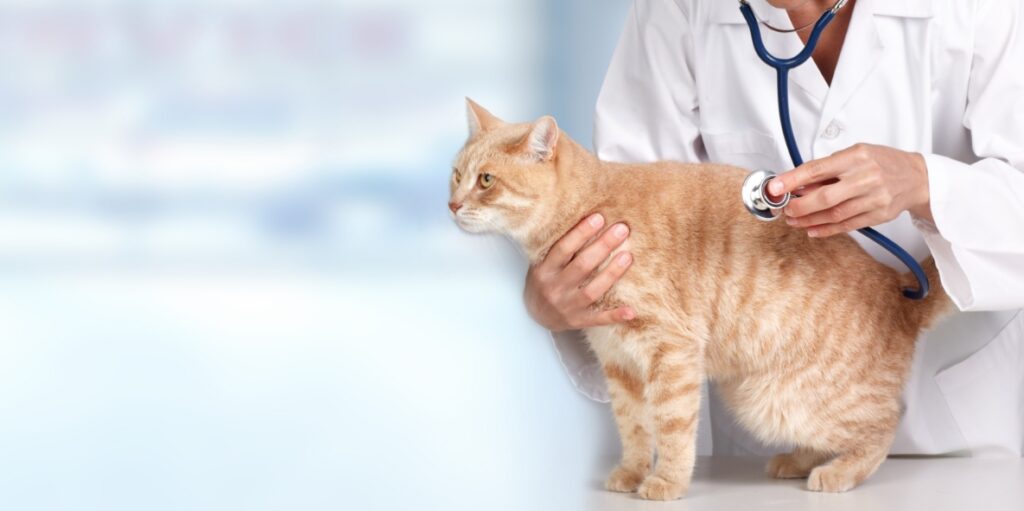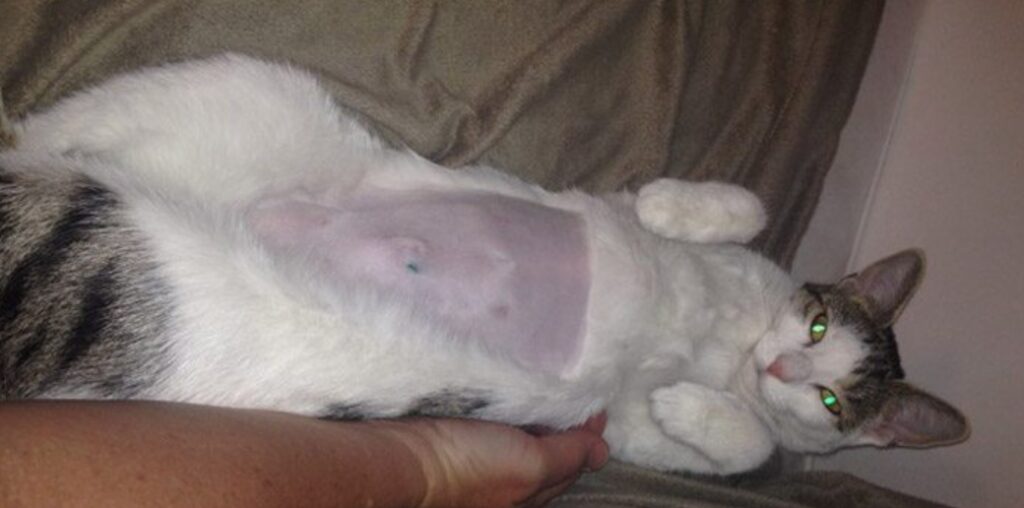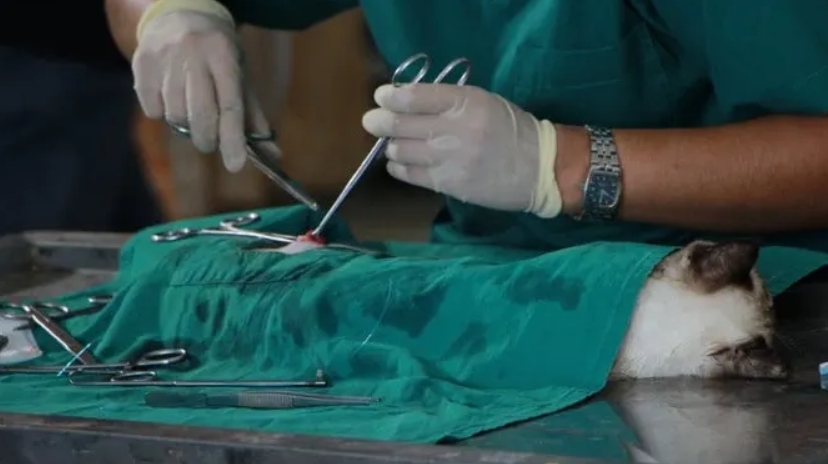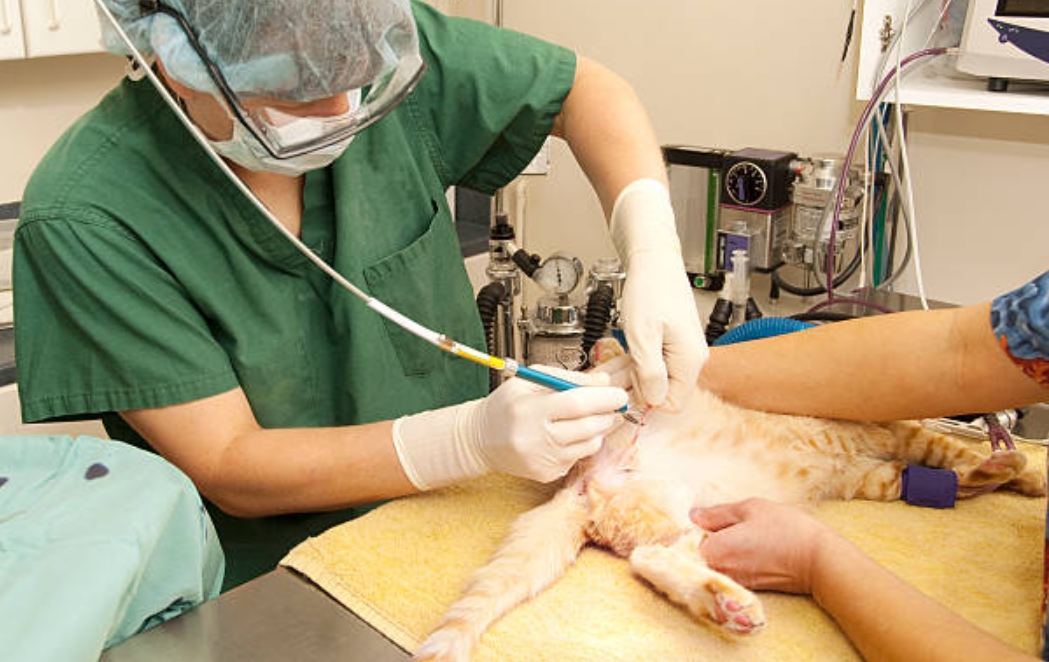Cat neutering is a common surgical procedure that involves removing a male cat’s testicles or a female cat’s ovaries and uterus. This is done to prevent the cat from reproducing and exhibiting certain undesirable behaviors. Neutering is a safe and effective way to promote the health and well-being of your cat while also reducing the number of homeless cats in your community. It is a routine procedure that is performed by veterinarians all over the world. In this blog post, we will discuss the top five benefits of cat neutering, including improved health, reduced aggression, cost savings, and a higher quality of life for your feline companion. The Best 5 Cat Breeds For Home
Benefit 1: Improved Health and Longevity
Neutering your cat has numerous health benefits. It decreases the risk of certain reproductive cancers and infections and prevents unwanted behaviors that can lead to injuries and illnesses. In female cats, neutering eliminates the risk of uterine infections and uterine cancer, while in male cats, it eliminates the risk of testicular cancer. Additionally, neutering can reduce the risk of certain behavioral and medical issues, such as roaming, aggression, and urine marking. Overall, neutering your cat is a simple procedure that can have significant long-term health benefits, leading to a happier and healthier life for your feline friend.
Decreased risk of certain cancers and infections:
Neutering your cat reduces the risk of several reproductive-related cancers and infections. In female cats, neutering eliminates the risk of uterine infections and uterine cancer, which can be fatal. In male cats, neutering eliminates the risk of testicular cancer, which can also be life-threatening. Additionally, neutered cats are less likely to contract diseases such as feline leukemia and FIV (feline immunodeficiency virus), which can be spread through mating. By removing the reproductive organs, neutering decreases the chances of these diseases and cancers occurring, helping your cat to live a longer and healthier life.
Prevention of unwanted behaviors and injuries:
Neutering your cat can prevent unwanted behaviors and injuries. Male cats that are not neutered tend to roam in search of a mate, which increases their risk of getting into fights and sustaining injuries. Neutering reduces this behavior and minimizes the risk of injury. Additionally, neutered cats are less likely to exhibit aggressive behaviors, such as biting and scratching, that can cause harm to themselves and others. Neutering also reduces the likelihood of spraying, a behavior where cats mark their territory with urine, which can damage furniture and fabrics. By preventing these unwanted behaviors, neutering helps to keep your cat safe and healthy.
Reduced risk of reproductive-related health issues:
Neutering your cat can reduce the risk of reproductive-related health issues. In female cats, neutering eliminates the risk of pyometra, a potentially fatal infection of the uterus. It also reduces the risk of mammary tumors, which can be malignant. In male cats, neutering eliminates the risk of testicular cancer, which can spread to other organs. It also reduces the risk of prostate problems, which can cause difficulty in urination. By removing the reproductive organs, neutering minimizes the chances of these health issues occurring, allowing your cat to live a healthier and happier life.
Benefit 2: Better Behavior and Reduced Aggression
Cat neutering can have a significant impact on a cat’s behavior, reducing aggression and promoting better behavior overall. Neutered cats are less likely to exhibit territorial behaviors, such as spraying and fighting, which can result in injuries and damage to property. They are also less likely to display aggressive behavior towards their owners or other pets. Neutering reduces the production of hormones that can contribute to these behaviors, leading to a more calm and content cat. By promoting better behavior and reducing aggression, neutering can enhance the relationship between you and your feline companion, leading to a happier and healthier household.
Decreased territorial and mating behaviors:
Cat neutering can decrease territorial and mating behaviors, which can cause problems for both cats and their owners. Male cats that are not neutered tend to wander in search of mates, which can result in them becoming lost or injured. Neutering reduces this behavior and minimizes the risk of injury or loss. Additionally, neutered cats are less likely to spray or mark their territory with urine, which can damage property and be difficult to clean. By removing the hormonal drive to mate and establish territory, neutering can lead to a more peaceful household and a happier cat.
Reduced risk of spraying and marking:
Neutering your cat can reduce the risk of spraying and marking, which can be problematic for both cats and their owners. Spraying is a behavior where cats mark their territory with urine, and it can be difficult to control. Unneutered male cats are more likely to spray than neutered ones. Neutering reduces the hormonal drive to mark territory, making it less likely that your cat will spray in the house. Additionally, neutering can reduce the odor and frequency of urine marking, making it easier to keep your home clean and odor-free. By reducing the risk of spraying and marking, neutering can lead to a more harmonious household for both you and your cat.
Improved socialization and interaction:
Cat neutering can improve a cat’s socialization and interaction with humans and other pets. Unneutered cats may be more territorial and aggressive towards other animals, making it difficult for them to socialize and interact peacefully. Neutered cats are often more relaxed and friendly towards other cats and pets, making it easier to introduce them to new animals in the household. Neutered cats may also be more affectionate towards their owners, seeking out attention and interaction. By promoting better socialization and interaction, neutering can enhance the bond between you and your cat and create a happier and more harmonious household.
Benefit 3: Cost Savings for Pet Owners
Neutering your cat can lead to cost savings for pet owners. The cost of caring for a litter of kittens can be significant, including expenses such as food, litter, and veterinary care. Neutering your cat can prevent unplanned litters, avoiding the costs associated with caring for and finding homes for the kittens. Neutering can also reduce the risk of health problems and injuries that may require costly veterinary care. Additionally, some cities and counties offer low-cost or free neutering programs for pet owners, making it more affordable to neuter your cat. By preventing unplanned litters and reducing health risks, neutering can lead to significant cost savings for pet owners.
Avoidance of expensive medical treatments:
Neutering your cat can help you avoid expensive medical treatments. Unneutered cats are at higher risk for reproductive-related health issues such as testicular cancer and uterine infections, which can be costly to treat. Neutering removes the risk of these health problems, leading to fewer veterinary bills and a healthier cat. Additionally, neutered cats are less likely to roam and get into fights with other animals, which can result in injuries that require veterinary care. By preventing these types of health problems and injuries, neutering can help pet owners save money on medical treatments and maintain a happier and healthier cat.
Prevention of unplanned litter and related costs:
Neutering your cat can prevent unplanned litter and related costs. Unneutered cats can mate and reproduce, leading to an unwanted litter of kittens. These litters can result in expenses such as food, litter, and veterinary care for the mother and kittens. Neutering removes the risk of unplanned litters, ensuring that your cat won’t contribute to the cat overpopulation problem. Additionally, many animal shelters are overcrowded with cats, making it difficult to find homes for all the kittens. By preventing unplanned litters, neutering can help reduce the number of cats that end up in shelters and improve the lives of cats everywhere.
Elimination of costs associated with unwanted behaviors:
Neutering your cat can eliminate costs associated with unwanted behaviors. Unneutered cats can exhibit behaviors such as spraying, aggression, and roaming that can be difficult and expensive to manage. Spraying can result in the need for costly cleaning products and can damage furniture and carpeting. Aggression can lead to injuries to other pets or people, resulting in veterinary or medical bills. Roaming cats may get lost or injured, leading to costly search and rescue efforts or veterinary care. By eliminating these unwanted behaviors through neutering, pet owners can save money on the costs associated with managing and repairing the damage caused by these behaviors.
Benefit 4: Reducing Overpopulation and Euthanasia
Neutering your cat can help reduce overpopulation and euthanasia. Unplanned littering of kittens can contribute to the already high numbers of homeless cats in animal shelters. Many of these cats end up being euthanized due to a lack of available homes. By neutering your cat, you can prevent unplanned litters and do your part to help reduce the number of cats in shelters. Additionally, neutered cats are less likely to roam and mate with other cats, further reducing the risk of overpopulation. By reducing the number of cats in shelters, neutering can help decrease the need for euthanasia and improve the lives of cats everywhere.
Decreased number of homeless and feral cats:
Neutering your cat can help decrease the number of homeless and feral cats. Unneutered cats can mate and reproduce, leading to an unplanned litter of kittens that may be abandoned or end up living as feral cats. By neutering your cat, you can prevent unplanned litters and reduce the number of cats living on the streets. Additionally, neutered cats are less likely to roam and mate with feral cats, further reducing the risk of overpopulation. By decreasing the number of homeless and feral cats, neutering can help improve the lives of cats and reduce the burden on animal shelters and rescue organizations.
Reduced risk of euthanasia due to overcrowding in shelters:
Neutering your cat can reduce the risk of euthanasia due to overcrowding in shelters. Many animal shelters struggle to keep up with the number of homeless cats, and overcrowding can lead to the difficult decision to euthanize animals to make space. By neutering your cat, you can help prevent unplanned litters and decrease the number of cats in shelters. This can help reduce the risk of overcrowding and decrease the need for euthanasia. By doing your part to prevent overpopulation through neutering, you can help ensure that more cats have the chance to find loving homes and live happy, healthy lives.
Improved quality of life for cats and other animals:
Neutering your cat can improve its quality of life as well as the lives of other animals. Neutered cats are less likely to roam, fight, and display unwanted behaviors that can cause stress and harm to themselves and other animals. They are also less likely to contract and spread diseases through mating or fighting. By neutering your cat, you can help improve its health, reduce its risk of injuries, and increase its overall well-being. Additionally, by preventing overpopulation, neutering can help improve the lives of other animals by reducing competition for resources and decreasing the risk of disease transmission.
Benefit 5: Increased Quality of Life for Your Feline Companion

Neutering your cat can significantly increase its quality of life. Neutered cats are less likely to display unwanted behaviors such as spraying, aggression, and territorial marking. This can lead to a more harmonious and stress-free living environment for both you and your feline companion. Neutered cats are also less likely to develop reproductive-related health issues such as infections and cancers. This can result in a longer and healthier life for your cat. Additionally, neutered cats tend to have a more stable and consistent temperament, making them easier to train and bond with. By neutering your cat, you can help ensure that they live a happy, healthy, and fulfilling life.
Reduced stress and discomfort associated with heat cycles:
One significant benefit of neutering your cat is the reduction in stress and discomfort associated with heat cycles. Female cats can go into heat multiple times a year, which can cause them to become restless, vocalize loudly, and display unwanted behaviors such as urinating outside of the litter box. Neutering eliminates the need for heat cycles, resulting in a more relaxed and contented cat. It also reduces the risk of health issues such as uterine infections and cancers. By neutering your cat, you can help ensure their comfort and well-being, and reduce stress and frustration for both you and your cat.
Prevention of unwanted mating behaviors and aggression:
Another benefit of cat neutering is the prevention of unwanted mating behaviors and aggression. Unneutered male cats are more likely to display territorial and aggressive behaviors, such as fighting and spraying, as they seek to establish dominance and attract mates. Neutering can help to reduce these behaviors, making your cat calmer and more contented. Additionally, neutered male cats are less likely to roam, reducing their risk of injury or getting lost. By neutering your cat, you can help ensure their safety and reduce the risk of conflict with other cats in the neighborhood.
Improved overall health and well-being for your cat:
In addition to the specific benefits mentioned, neutering your cat can lead to improved overall health and well-being. Neutered cats are less prone to roam, fight, or get into accidents, which reduces their risk of injuries, infections, and diseases. They are also less likely to develop reproductive-related health issues, such as testicular cancer or uterine infections. By eliminating the stress and discomfort associated with heat cycles, neutering can also help to improve your cat’s mental and emotional health. Overall, neutering your cat is an effective way to promote their long-term health and happiness, while also reducing the risk of unwanted behaviors and health problems.
What steps do cat owners need to take to neuter a cat?

Neutering a cat is a straightforward and common procedure, but it can be a bit more complicated for dog owners. It is essential to follow the right steps to ensure a successful and safe procedure. Here are some steps cat owners can take to neuter their dogs:
Step 1: Consult with a Veterinarian
The first step in neutering your cat is to consult with a veterinarian. Your veterinarian can provide you with information about the procedure, including the risks and benefits, and help you decide if neutering is the right choice for your cat. They can also recommend the best time to neuter your cat, which is typically around four to six months of age.
Example: You can schedule an appointment with a veterinarian to discuss neutering your cat. They can answer any questions you may have and provide guidance on the best course of action.
Step 2: Prepare Your Cat for Surgery
Before the surgery, you’ll need to prepare your cat by following any instructions provided by your veterinarian. This may include fasting your cat for a certain amount of time before the surgery, providing them with a comfortable and warm place to rest after the procedure, and keeping them calm and relaxed leading up to the surgery.
Example: Your veterinarian may advise you to stop giving your cat food and water for a specific period of time before the surgery. They may also recommend providing your cat with a comfortable bed or crate to rest in after the procedure.
Step 3: Schedule the Surgery
Once you have consulted with a veterinarian and prepared your cat for surgery, the next step is to schedule the procedure. You’ll need to coordinate with your veterinarian to determine the best time and date for the surgery and arrange to drop off and pick up your cat on the day of the procedure.
Example: You can call your veterinarian’s office to schedule the surgery. They will likely provide you with instructions on what to do on the day of the procedure, such as when to bring your cat in and what to expect afterwards.
Step 4: Follow Post-Operative Care Instructions
After the surgery, your cat will need some time to recover. Your veterinarian will provide you with post-operative care instructions, which may include administering medication, monitoring your cat’s incision site, and limiting its activity until they have fully healed.
Example: Your veterinarian may provide you with medication to help manage your cat’s pain or prevent infection. They may also recommend limiting your cat’s physical activity and monitoring their incision site for any signs of complications. Following these instructions can help ensure a smooth and successful recovery for your cat.
Cat Neutering: Downside and Risks

While cat neutering is generally considered a safe procedure, there are some risks and potential downsides that cat owners should be aware of. Here are some of the most common risks and downsides associated with cat neutering:
Common Cat Diseases and Symptoms
Anesthesia risks:
The use of anesthesia during the procedure carries some risks, particularly for older or sick cats. However, the risk is generally low, and modern anesthesia techniques have significantly reduced these risks.
Surgical complications:
Like any surgery, there is a risk of surgical complications such as infection, bleeding, or adverse reactions to medications. However, these complications are rare and can often be prevented or managed with proper care.
Changes in behavior:
Neutering can alter a cat’s behavior, causing them to become more sedentary and less interested in marking its territory. While this may be beneficial for some cat owners, it could be a downside for others who enjoy their cat’s active and playful behavior.
Weight gain:
Neutered cats are at a higher risk of gaining weight, which can lead to health problems such as diabetes and joint issues. Owners can manage this risk by monitoring their cat’s diet and exercise habits.
Long-term health risks:
Some studies suggest that neutering may increase the risk of certain health problems, such as certain cancers and urinary tract issues. However, the evidence is not conclusive, and the overall health benefits of neutering still outweigh the potential risks.
Overall, while there are some risks and potential downsides associated with cat neutering, it is still considered a safe and beneficial procedure for most cats. Owners should discuss any concerns with their veterinarian and take steps to minimize any potential risks or downsides. Read more about Neutering – Wikipedia.
Conclusion of Cat Neutering
In conclusion, cat neutering is a highly recommended procedure for cat owners who wish to ensure the health and happiness of their feline companions. The benefits of neutering, including improved health, better behavior, cost savings, reduced overpopulation, euthanasia, and increased quality of life, far outweigh any potential risks or downsides. It is a safe and effective procedure that can also have a positive impact on the broader community of animals.
While there may be some minor risks and potential complications associated with the procedure, these can be minimized by selecting a qualified and experienced veterinarian and providing proper post-operative care. It is important to discuss the best age and timing for the procedure with your veterinarian, as well as any concerns or questions you may have.
By choosing to neuter your cat, you are taking an important step towards responsible pet ownership and helping to ensure the well-being of your cat and other animals. It is a small investment that can have a significant impact on the long-term health and happiness of your feline companion.
Train Your Cat in 5 Simple Steps: A Beginner’s Guide
Fellow cat owners, your every single comment is very valuable to us and all our readers. Please share with us your cat neutering experiences with us. Your advice will give us a proper guideline. Thanks

